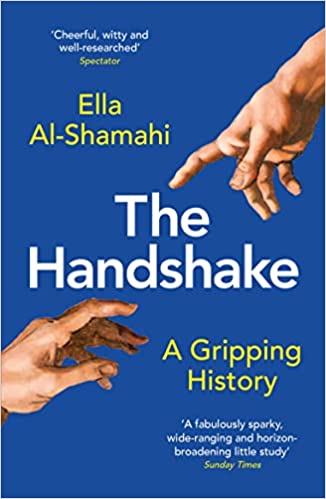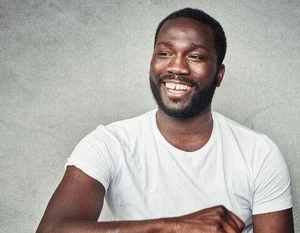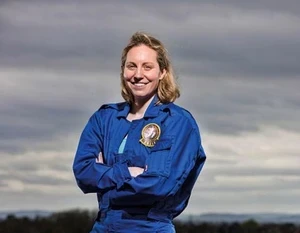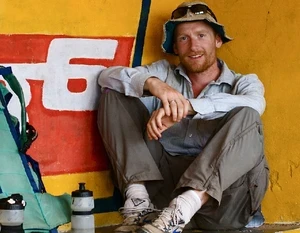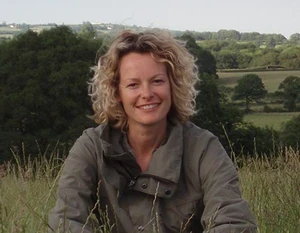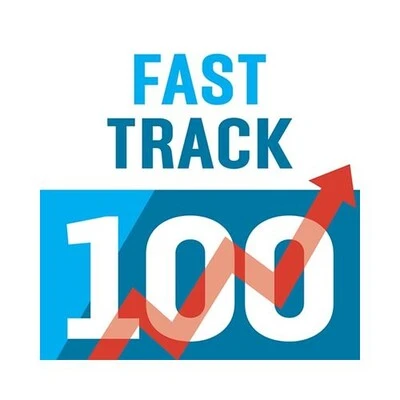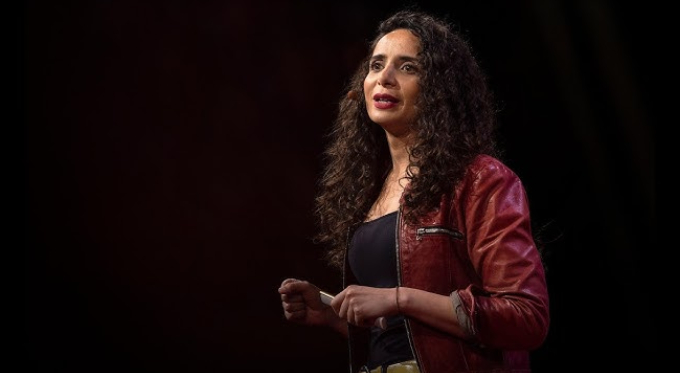
Ella Al-Shamahi is a renowned Paleoanthropologist, Evolutionary Biologist, and stand-up comedian. One of the leading experts on Neanderthals, she is highly recognised for her award-winning documentaries on the BBC, Channel 4 and National Geographic. She is now highly sought after for speaking engagements, where she talks about palaeoanthropology, evolutionary biology, fossil hunting, archaeology, and exploration.
Educated at the prestigious University College London and Imperial College, Ella holds a BSc in Genetics and an MSc in Taxonomy. Known across the nation, Ella is a presenter and producer on BBC 2’s "Neanderthals: Meet Your Ancestors". She recently received acknowledgement for discovering the first evidence of battle injury on a female Viking Warrior while filming the National Geographic documentary, Viking Warrior Women. Undertaking expeditions in dangerous and unstable territories, including Iraq, Yemen, Syria and Nagorno-Karabakh, Ella is on a mission to bring attention to overlooked World Heritage sites. Most recently, in 2025, Ella became the presenter of "Human" on BBC2, a five-part science series telling the story of how humans became, reviewed as 5-star in The Guardian. Other television credits of Ella's include being the presenter of "What Killed the Whale?", "Tutamkhamun: Secrets of the Tomb" and "Jungle Mystery: Lost Kingdoms of the Amazon" for Channel 4, along with "Waterhole" and "Horizon: Body Clock - What Makes Us Tick?" for BBC2.
Possessing a remarkable sense of humour, Ella regularly performs science stand-up at prestigious venues, including the Edinburgh Fringe, Bloomsbury Theatre and National Geographic stage. Known for Stand-up at Seven and Gold Diggers, Ella also hosts Nature’s Worst, a science-based comedy show where panel members talk about species with inexcusable behaviour in an attempt to justify that behaviour. In recognition of her erudite anthropology knowledge, Ella was made Trustee of the International Association for the Study of Arabia and named National Geographic Emerging Explorer for 2015. She also regularly features in leading publications, such as National Geographic Magazine, The Telegraph, Times, and Sun. Ella is currently the host of the BBC's The Conversation podcast, on which she amplifies women's voices and hears from incredible women from across the globe. Ella is also the accomplished author of the Times Book of the Year, The Handshake.
Using comedy as a tool to make science more accessible, Ella captivates audiences in her speaking engagements with her profound knowledge of anthropology and thrilling adventures in dangerous and unstable territories around the world. As a seasoned speaker, Ella has already delivered the TEDx Talks "The Fascinating (and Dangerous) Places Scientists Aren't Exploring", which was watched 2.5 million times, and "Fossil Hunting in the Yemen: Archaeologists Without Borders". If you are looking for a keynote speaker who makes exploration and science more accessible, hire Ella Al-Shamahi today!
Ella Al-Shamahi's official speaking topics are listed below:
Exploring Dangerous Places - Adventure with Purpose & Why Science has a Geography Problem:
Exploring unstable, hostile and disputed territories may sound like a catchy tag line, like the basis of some great stories in a pub, but might it actually also be the frontline of C21st exploration? Ella Al-Shamahi argues that if you want to make discoveries – perhaps the best places to look aren’t those with lots of scientists and researchers but the places that have been largely ignored thanks to instability. In a candid, often amusing talk, she discusses everything from landmines to pirates to safety and security protocols. She asks why many research institutions deem entering an unstable region to be a no-go, but risky research involving cave diving or deep-sea exploration is met with nuance. But mostly, she argues that it is a tragedy for science if we ignore huge parts of the planet’s scientific potential, and it is also a tragedy for the people living in these forgotten or misunderstood places. Listen to her detail her expeditions and TV shows in some of the most fascinating corners of our planet and her take on these as a woman, as a British-Yemeni, as a TV presenter and as a National Geographic Explorer.
Human Origins & Neanderthals/Human Evolution:
Are you a Neanderthal Once upon a time there were many species of human sharing the planet, it was like a different world, some of the species you might recognise – the so called hobbits (Homo floresensis) and Neanderthals and others you might not – like Denisovans and Naledi. Like Lord of The Rings they sometimes interbred. And so it turns out this is the only time in human history that only one species of human walks the Earth. What happened? Why are we the only ones left?
We don’t have definitive answers to these questions, but we do have a new tool- ancient DNA. It has created a revolution in archaeology. Ancient DNA is the gift that keeps on giving. Thanks to ancient DNA, we now know all kinds of things, like that our ancestors interbred with Neanderthals, that most of us have about 2% Neanderthal DNA and that Tibetans have a gene that helps them live high up in the mountains because their ancestors interbred with an ancient human species. Using the latest breakthroughs as the backdrop, I discuss who we are and who the others, like the Neanderthals, were. What makes us different… and what makes us the same… and what, if anything, is evolution doing about our future?
Communication, Shifting Paradigm & Living in a Post-Truth Era - Communication of Science & How to Save Humanity:
Some say you can’t get people to change their minds. Don’t bother with people who don’t believe in climate change or evolution. But Ella Al-Shamahi went to university at the age of 18, a creationist intent on finding the flaws in the theory of evolution, and now she is an evolutionary biologist, on screens across the UK and US, talking about evolution. Ella believes in paradigm shifts, because she lived one.
In this talk, Ella talks about the power of communication, but also the power of empathy and the power of tribalism. In the necessity of understanding why people hold the views they do, and why we need to insist on bringing everyone (from ethnicity to political affiliation) to the table to fight the big existential challenges like climate change.
Ella looks at a few of her projects from TV shows, to Ted talk, to expeditions, to her first book and picks out a few case studies, times when she and the teams she works with attempted to shift the paradigm that many in the general public still hold dear. She will be highlighting the aims, the successes, as well as the limitations, weaknesses and pitfalls. Topics will include rebranding Neanderthals, Viking women warriors, the indigenous history of the Amazon, the handshake and writing off the science potential of politically unstable places.
How to be a 21st Century Explorer - Adventure Stories, Dodging Landmines in the Name of Science, Ambitions & Making Them Work & How to Embrace the Life You Want:
There is no feeling on earth like jumping out of a jeep and looking at the mountains you are about to explore for the first time. You wonder if you might be about to make a discovery, and that thought actually takes your breath away. Yet for most of my life, I thought explorers only existed in previous centuries… and only existed as men. This is an aspirational talk about the frontline of science exploration, filled with anecdotes, life lessons and challenges. It covers some science on one end (why are we the only species of human left on Earth?), but is designed to get people thinking about less traditional paths, how to draw up an ambitious plan for your own life and importantly, how to think out of the box. Who better than a National Geographic explorer, palaeoanthropologist, TV presenter AND stand-up comic to do that? All laced with stories of dodging landmines, snakes, pirates and of course, toilets in hostile and remote territories.
Official Feedback from In-Person & Virtual Events
"The perfect blend of wit and sarcasm. This talented scientist turned comedian is fearless." - Wesley, Director of Live Events & Experiences, National Geographic Society
- 2025 - Presenter of "Human" on BBC2
- 2022 - Presenter of "Who Killed the Whale?" on Channel 4
- 2022 - Presenter of "Tutankhamun: Secrets of the Tomb" on Channel 4
- 2020 - Presenter of "Waterhole" on BBC2
- 2020 - Presenter of "Jungle Mystery: Lost Kingdoms of the Amazon" on Channel 4
- 2019 - Delivered the TED Talk "The Fascinating (and Dangerous) Places
- 2019 - Presenter of the Horizon episode "Body Clock: What Makes Us Tick?"
- 2018 - Presenter of "Neanderthals: Meet Your Ancestors" on BBC2
- 2016 - Delivered the TEDx Talk "Fossil Hunting in the Yemen: Archaeologists Without Borders"
- 2015 - Named a National Geographic Emerging Explorer
- Trustee of the International Association for the Study of Arabia
How to hire Ella Al-Shamahi
Contact the Champions Speakers Agency to provisionally enquire about hiring Ella Al-Shamahi for your next event, today. To get in touch, simply call an official booking agent on 0207 1010 553 or email us at [email protected] for more information.
** We do NOT accept requests for autographs, signed merchandise, fan mail, birthday messages or any other non-commercial contact with the speakers or acts. Each speaker on the website may not have necessarily worked with Champions in the past but are known to perform such engagements within the industry.

